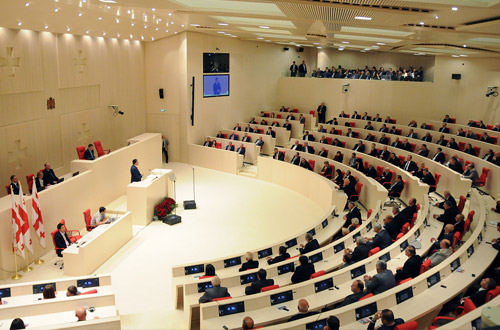Shorena Kakabadze, Kutaisi
Last week, Parliament of Georgia passed amendments to the Code on Local Self-Governance with 84 votes vs 14 via second hearing. The Code, which is enclosed with 24 draft laws, was fundamentally changed and became topic of hot discussions and controversy within the parliament and outside.
“The new Code is based on reformatory amendments, which will establish European standards of self-governance,” the government states. “These amendments will not change the Code so that it could improve election environment. Just the opposite, it is a step back for the self-governments,” the opposition replies.
In parallel to it, debates on contradictory arguments will be organized in different formats. Parliamentary fraction United National Movement had alternative proposals but the parliamentary majority did not support them.
“We spoke about fundamental changes in the Code on Local Self-Governance, that would have established real self-governance in the towns and villages. However, as you see, it did not happen and instead we received multi-volume document, which represents many opinions but nothing is said about real self-governance. So, there is no progress in this direction,” MP Giorgi Vashadze from the minority said.
MP Vashadze said direct election of district governors and city mayors according to the legislative amendments is a step forward and welcomes this initiative; however, the role of the municipal boards and city councils (Sakrebulo) in the suspension of authority of the elected governors and mayors, is unacceptable for him. “Even this progressive part of the Code remains faulty. A mayor or a district governor, elected by people, cannot be resigned by the two third of the Sakrebulo without any grounds. Thus, we can declare that under this bill, which is already passed, no progress will be achieved in the self-governance.
MP Akaki Bobokhidze from the parliamentary minority clarified that authority of the two third of the Sakrebuli to suspend authority of the governor and the mayor is sort of self-defense for the current government. “They need some self-defense mechanism, which will go in force under this article. In other words, if undesirable person is elected in any city or village, the government will “correct” this “mistake” with the support of the municipal boards and city councils. Thus, direct election of mayors and governors is really a step forward but it will not be a reform but only change in the election rules.”
Members of the parliamentary majority claim the opposition is too critical about the Code and the situation is much better than the minority perceives it. Namely, according to the bill passed through second hearing, Sakrebulo will not be able to suspend the authority of the elected mayor or governor before the court passes relevant judgment. So, snap elections will not be fixed in any cities or districts before the court judgment.
“It is not excluded that the court will justify mayor or governor and concludes that the decision of the Sakrebulo is ungrounded. In similar situation, the person will keep the position and continue his/her work,” MP Zakaria Kutsnashvili from the majority clarified.
MP Kutsnashvili, like almost every member of the ruling party, is satisfied with the legislative changes. MPs believe enough significant provisions will be changed in the Code on Local Self-Governance. Namely, barer for the election of mayors in self-governing cities will be 40% that is much higher than previous one. Threshold for the political parties to enter the municipal boards or city councils will also be lowered from 5 to 4%.
News
December 13, 2023
Ethnic minorities outside the peace dialogue
November 6, 2023
‘Peace’ agenda of political parties
Popular
Articles
February 13, 2024




